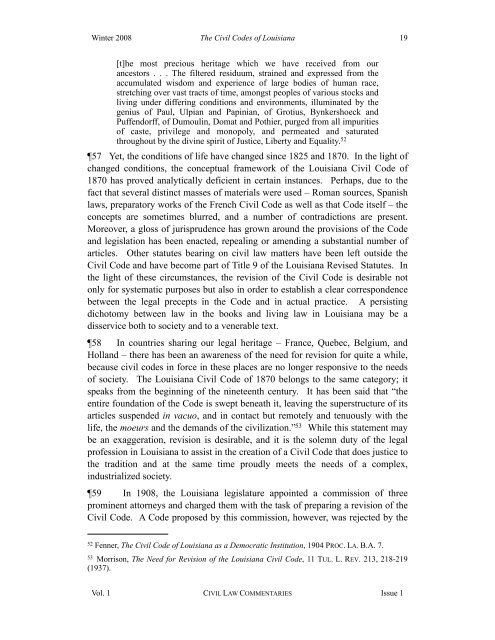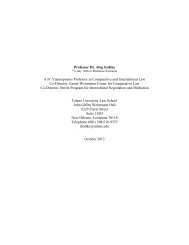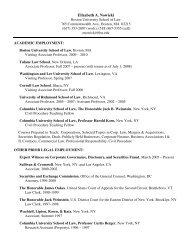Civil Codes of Louisiana - Tulane Law School - Tulane University
Civil Codes of Louisiana - Tulane Law School - Tulane University
Civil Codes of Louisiana - Tulane Law School - Tulane University
You also want an ePaper? Increase the reach of your titles
YUMPU automatically turns print PDFs into web optimized ePapers that Google loves.
Winter 2008 The <strong>Civil</strong> <strong>Codes</strong> <strong>of</strong> <strong>Louisiana</strong> 19<br />
[t]he most precious heritage which we have received from our<br />
ancestors . . . The filtered residuum, strained and expressed from the<br />
accumulated wisdom and experience <strong>of</strong> large bodies <strong>of</strong> human race,<br />
stretching over vast tracts <strong>of</strong> time, amongst peoples <strong>of</strong> various stocks and<br />
living under differing conditions and environments, illuminated by the<br />
genius <strong>of</strong> Paul, Ulpian and Papinian, <strong>of</strong> Grotius, Bynkershoeck and<br />
Puffendorff, <strong>of</strong> Dumoulin, Domat and Pothier, purged from all impurities<br />
<strong>of</strong> caste, privilege and monopoly, and permeated and saturated<br />
throughout by the divine spirit <strong>of</strong> Justice, Liberty and Equality. 52<br />
57 Yet, the conditions <strong>of</strong> life have changed since 1825 and 1870. In the light <strong>of</strong><br />
changed conditions, the conceptual framework <strong>of</strong> the <strong>Louisiana</strong> <strong>Civil</strong> Code <strong>of</strong><br />
1870 has proved analytically deficient in certain instances. Perhaps, due to the<br />
fact that several distinct masses <strong>of</strong> materials were used – Roman sources, Spanish<br />
laws, preparatory works <strong>of</strong> the French <strong>Civil</strong> Code as well as that Code itself – the<br />
concepts are sometimes blurred, and a number <strong>of</strong> contradictions are present.<br />
Moreover, a gloss <strong>of</strong> jurisprudence has grown around the provisions <strong>of</strong> the Code<br />
and legislation has been enacted, repealing or amending a substantial number <strong>of</strong><br />
articles. Other statutes bearing on civil law matters have been left outside the<br />
<strong>Civil</strong> Code and have become part <strong>of</strong> Title 9 <strong>of</strong> the <strong>Louisiana</strong> Revised Statutes. In<br />
the light <strong>of</strong> these circumstances, the revision <strong>of</strong> the <strong>Civil</strong> Code is desirable not<br />
only for systematic purposes but also in order to establish a clear correspondence<br />
between the legal precepts in the Code and in actual practice. A persisting<br />
dichotomy between law in the books and living law in <strong>Louisiana</strong> may be a<br />
disservice both to society and to a venerable text.<br />
58 In countries sharing our legal heritage – France, Quebec, Belgium, and<br />
Holland – there has been an awareness <strong>of</strong> the need for revision for quite a while,<br />
because civil codes in force in these places are no longer responsive to the needs<br />
<strong>of</strong> society. The <strong>Louisiana</strong> <strong>Civil</strong> Code <strong>of</strong> 1870 belongs to the same category; it<br />
speaks from the beginning <strong>of</strong> the nineteenth century. It has been said that “the<br />
entire foundation <strong>of</strong> the Code is swept beneath it, leaving the superstructure <strong>of</strong> its<br />
articles suspended in vacuo, and in contact but remotely and tenuously with the<br />
life, the moeurs and the demands <strong>of</strong> the civilization.” 53 While this statement may<br />
be an exaggeration, revision is desirable, and it is the solemn duty <strong>of</strong> the legal<br />
pr<strong>of</strong>ession in <strong>Louisiana</strong> to assist in the creation <strong>of</strong> a <strong>Civil</strong> Code that does justice to<br />
the tradition and at the same time proudly meets the needs <strong>of</strong> a complex,<br />
industrialized society.<br />
59 In 1908, the <strong>Louisiana</strong> legislature appointed a commission <strong>of</strong> three<br />
prominent attorneys and charged them with the task <strong>of</strong> preparing a revision <strong>of</strong> the<br />
<strong>Civil</strong> Code. A Code proposed by this commission, however, was rejected by the<br />
52 Fenner, The <strong>Civil</strong> Code <strong>of</strong> <strong>Louisiana</strong> as a Democratic Institution, 1904 PROC. LA. B.A. 7.<br />
53 Morrison, The Need for Revision <strong>of</strong> the <strong>Louisiana</strong> <strong>Civil</strong> Code, 11 TUL. L. REV. 213, 218-219<br />
(1937).<br />
Vol. 1 CIVIL LAW COMMENTARIES Issue 1





